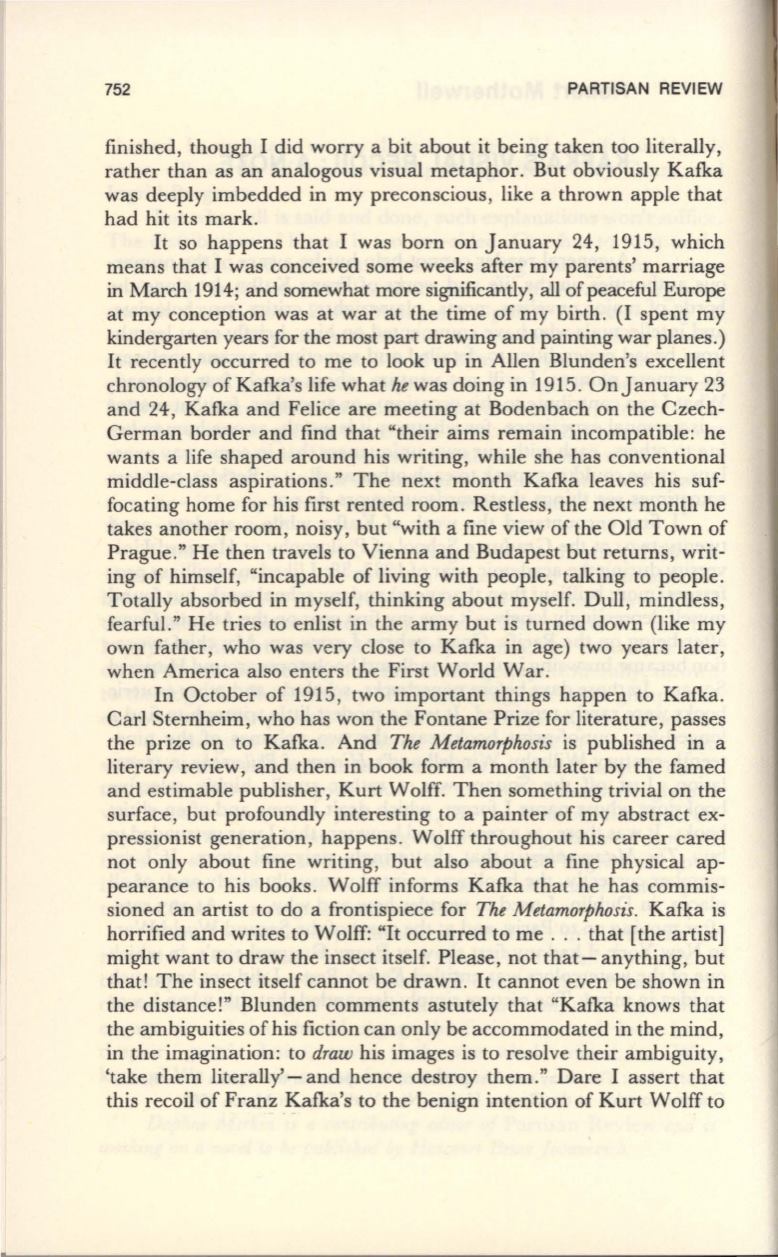
752
PARTISAN REVIEW
finished , though I did worry a bit about it being taken too literally,
rather than as an analogous visual metaphor. But obviously Kafka
was deeply imbedded in my preconscious , like a thrown apple that
had hit its mark.
It
so happens that I was born on January 24, 1915, which
means that I was conceived some weeks after my parents' marriage
in March 1914; and somewhat more significantly,
all
of peaceful Europe
at my conception was at war at the time of my birth. (I spent my
kindergarten years for the most part drawing and painting war planes.)
It recently occurred to me to look up in Allen Blunden's excellent
chronology of Kafka's life what
he
was doing in 1915. On January 23
and 24 , Kafka and Felice are meeting at Bodenbach on the Czech–
German border and find that "their aims remain incompatible : he
wants a life shaped around his writing, while she has conventional
middle-class aspirations." The next month Kafka leaves his suf–
focating home for his first rented room. Restless , the next month he
takes another room, noisy, but "with a fine view of the Old Town of
Prague." He then travels to Vienna and Budapest but returns, writ–
ing of himself, "incapable of living with people, talking to people.
Totally absorbed in myself, thinking about myself. Dull, mindless,
fearful." He tries to enlist in the army but is turned down (like my
own father, who was very close to Kafka in age) two years later,
when America also enters the First World War .
In October of 1915 , two important things happen to Kafka.
Carl Sternheim, who has won the Fontane Prize for literature, passes
the prize on to Kafka . And
The Metamorphosis
is published in a
literary review, and then in book form a month later by the famed
and estimable publisher, Kurt Wolff. Then something trivial on the
surface, but profoundly interesting to a painter of my abstract ex–
pressionist generation , happens. Wolff throughout his career cared
not only about fine writing, but also about a fine physical ap–
pearance to his books. Wolff informs Kafka that he has commis–
sioned an artist to do a frontispiece for
The Metamorphosis.
Kafka is
horrified and writes to Wolff: "It occurred to me ... that [the artist]
might want to draw the insect itself. Please, not that- anything, but
that! The insect itself cannot be drawn. It cannot even be shown in
the distance!" Blunden comments astutely that "Kafka knows that
the ambiguities of his fiction can only be accommodated in the mind,
in the imagination: to
draw
his images is to resolve their ambiguity,
'take them literally'- and hence destroy them." Dare I assert that
this recoil of Franz Kafka's to the benign intention of Kurt Wolff to


